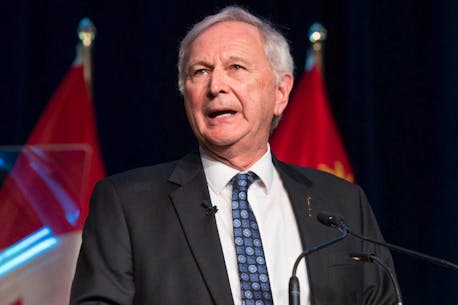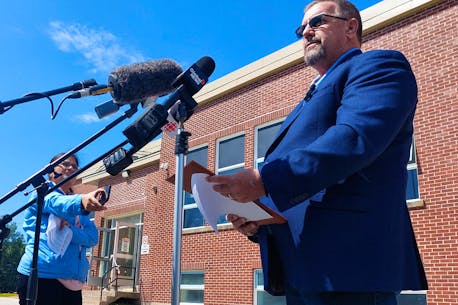Saskatchewan
'We are not backing down': Premier Moe says legislation on parental rights coming this fall
Christian group says it influenced Sask. government over pronoun rules, province denies this
Saskatchewan Premier Scott Moe says he plans to introduce legislation this fall aimed at protecting parental rights.
Moe made the comments at the premier's dinner in Regina on Thursday night and again on social media Friday.
"We are not backing down," the premier said. His office said in an email to CBC that further details about the legislation, which is currently being developed for introduction in the assembly this fall, will be announced "in due course."
In late August, former education minister Dustin Duncan banned third-party organizations from teaching sexual education courses, and said parents could pull children from participating. He also mandated that children under 16 require parental consent if they want to go by different names or pronouns at school.
Christian group says it influenced government
The founder of a group described as a national Christian organization said it has been successful in influencing the Saskatchewan Party government to adopt pronoun and sexual education policies that affect children at school.
Tanya Gaw, founder of Action4Canada, said her group urged the Saskatchewan government to ban Planned Parenthood and SOGI 123, a sexual health resource, from schools months before the province did so.
Gaw said Action4Canada got more than 10,000 emails, on behalf of petitioners, sent to former education minister Dustin Duncan and Premier Scott Moe. She said one of her members also had a face-to-face conversation with Duncan's staff in April, serving what the group calls a "notice of liability" for "causing harm" to children by exposing them to "sexually explicit" resources.
Gaw did not say how many of those emails came from Saskatchewan residents or parents with young children.
"The premier and others also had a meet-and-greet in a park, which was a good opportunity to get some of the information in their hands," Gaw said in a recent interview.
"It was just a consistent pursuing of their office, providing information in the files that we had."
UR Pride, a community organization representing LGBTQ people in Regina, has filed legal action against the government over the pronoun policy.
It said the policy violates Charter rights because it could out kids to their parents or result in teachers misgendering them at school. A judge is expected to hear the case Sept. 19.
WATCH | Former teacher speaks out on Sask. government's new education policy:
Michael Megenbir came out as transgender while he was a teacher in Regina in 2017. He changed his name and pronouns and he had students who chose to do the same.
Gaw said the changes are a "partial win," because the group also wanted non-governmental and "special interest group" flags, including Pride flags, to be banned from schools.
"None of this should be in schools," she said.
A government spokesperson said in an email earlier this week there was no influence from Action4Canada and "the policy was influenced by parents across Saskatchewan."
The province has said schools are to provide supports to children who won't be accepted at home for their gender identity, though it has not detailed how that would work.
On its website, Action4Canada says schools are "indoctrinating" children over LGBTQ issues. It also believes in "climate fraud" and has been vocal against COVID-19 mandates.
Gaw organized a similar campaign in support of New Brunswick's pronoun policy, flooding elected officials with emails. New Brunswick requires parental consent when children under 16 want to use different names or pronouns, though psychologists and social workers can continue using children's chosen names.
Helen Kennedy, the executive director of Egale Canada, a national LGBTQ organization, said claims of indoctrination ignore facts and data.
"Schools that have inclusive policies around issues of diversity, equity and inclusion have much healthier graduates," Kennedy said.
Egale, which is assisting UR Pride in its legal challenge, completed a report in 2021 that said "conservative political and religious groups" are manipulating gender issues to incite violence and discrimination against LBGTQ people.
"I think they're having tremendous influence," Kennedy said.
Members of groups like Action4Canada have gone to school board meetings in Saskatchewan over the past year to protest sex education and gender issues. Some have been disruptive.
On June 20, a group attended a Saskatoon Public Schools board meeting to voice concerns over sexual health education resources.
"Their attempts to disrupt the meeting continued, and tensions rose. At this point, the meeting was adjourned by board motion," a spokesperson with Saskatoon Public Schools said in a statement.
Members with the Regina Civic Awareness and Action Network have attended board meetings, raising concerns about "gender-affirming care," said Wayne Bernakevitch, a group founder.
"If some of them are a little bit out of place (in disrupting meetings), that's certainly not our doing," he said.
Bernakevitch worked at a major law firm in Regina before he retired and started the group.
He said his members have sent letters and emails to the government, outlining their concerns.
In July, a flyer circulated in some Regina neighbourhoods, urging people to contact Duncan and the board chair of Regina Public Schools over pronouns.
The flyer contained various website links and asked people to email a group called Unified Grassroots, which has been raising similar concerns.
Nadine Ness, the group's founder, said in a text message this week the organization is not responsible for the flyer.
WATCH | Hundreds rally against new pronoun, name policy in Sask. schools:
Hundreds of people rallied in front of the Saskatchewan Legislative Building to oppose the province's new policy requiring parental consent for name and pronoun changes in schools.
In June, her group urged people to sign Action4Canada's petition to have Planned Parenthood banned, citing a case where a staff member of the organization inadvertently took inappropriate sexual material to a Grade 9 class in a town north of Regina.
Ness's group also asked for SOGI 123 to be banned, saying it brings "radical gender ideology into schools."
The ARC Foundation, which developed SOGI 123, has said the resource is meant to make schools inclusive and safe.
Ness said parents have been making their voices heard.
"As for influence, it would be impossible to deny having had some form of influence for the simple fact we brought a lot of light to these issues affecting families."
With files from CBC's Dayne Patterson
Letters: Moe uses online survey to justify a bad decision for Sask.
Readers offer their opinions on Saskatchewan's new pronoun policy in schools and a new mini-park at a closed intersection in Saskatoon.
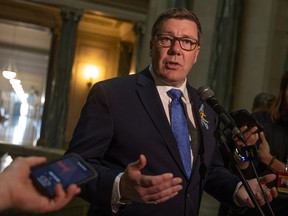
Article content
Saskatchewan Premier Scott Moe has referred to a survey of online panellists by Angus Reid to defend his government’s policy requiring parental consent for students under 16 to change their name or pronouns at school.
As I understand it, this survey was taken of panellists across Canada and eight per cent of the respondents (241 people) were from Saskatchewan. Of those 241 people, 50 per cent (120.5) were in favour of inform and consent from parents and 36 per cent (86 people) felt that parents must be informed.
Article content
Article content
Good to hear our government now justifies its policy on the basis of the wishes of 241 people who reside in the province.
I also note that two-thirds of the participants Canada wide were parents who did not have children under 18. Perhaps the survey should have been confined to those who have children under 18 — the ones who have children who will be directly affected by this policy.
Moe is playing with statistics in order to justify a bad policy decision made without any consultation with the affected school boards who are then forced to implement a policy that will harm children. Leave education to the educators and parents with children in the public schools.
William Roe, Saskatoon

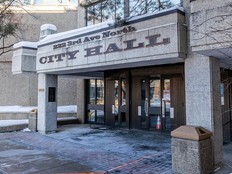




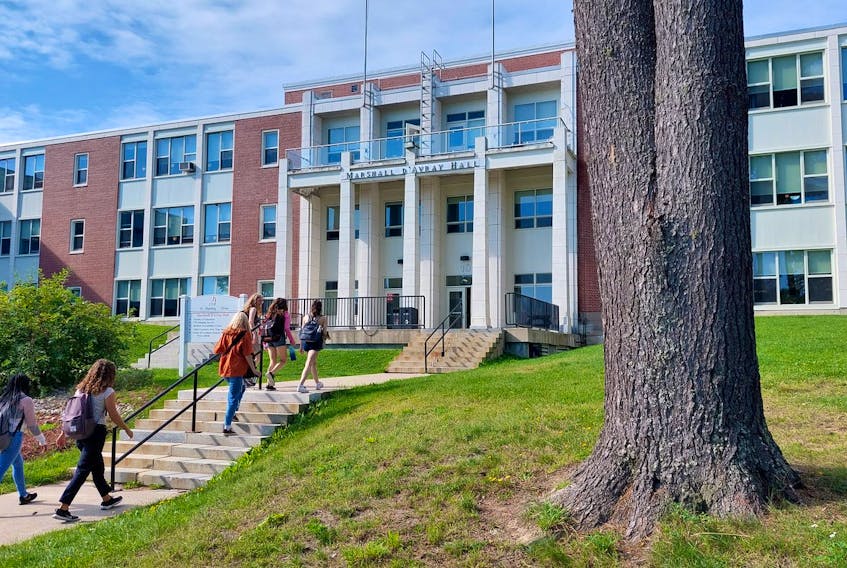
 Bill Hogan. - Local Journalism Initiative Reporter John Chilibeck
Bill Hogan. - Local Journalism Initiative Reporter John Chilibeck